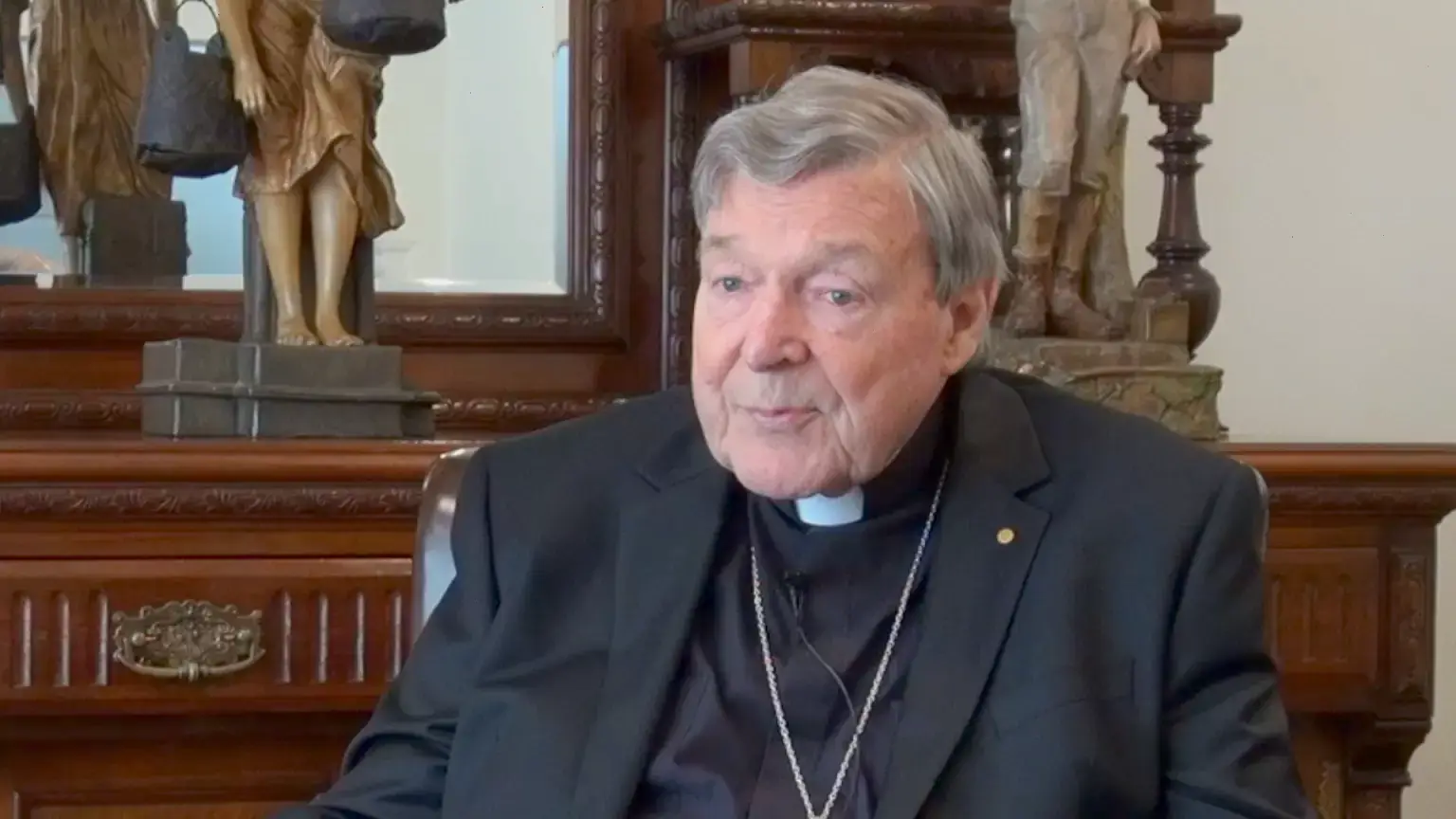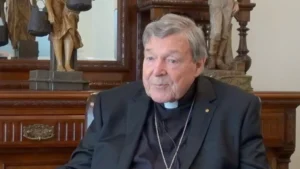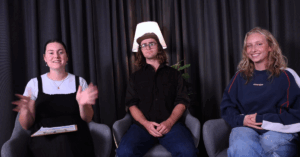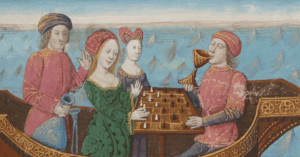

Campion College President Dr Paul Morrissey sat down with Cardinal Pell to discuss his time in prison, the value of a liberal arts education and some exciting new developments at Campion.
Transcript
Introduction
Hello, I’m Dr Paul Morrissey, President of Campion College, Australia’s first Liberal Arts college. Recently, I had the good fortune of sitting down with Cardinal George Pell, before he headed back to Rome. In our conversation, we talked about his time in prison, the importance of a liberal arts education, and some exciting new developments here at Campion College. I hope you enjoy the interview.
Interview
Dr Paul Morrissey: Well thanks for joining us, Your Eminence. You’ve lived a very public life and fulfilled many important roles, within the Church, particularly. I wonder if you could comment on how you see Australia, and the Western world more generally, at the moment. Are there any particular issues that concern you or give you hope?
Cardinal Pell: Well, there’s always hope because we’re Christians and Catholics. And if we remain faithful to the basics: prayer, repentance, faith, service, there’s always a capacity for renewal and I think Campion is an example of that. It’s not the biggest tertiary institution in Australia but it’s a real sign of hope. But the pressures on us are very significant; it’s not the worst of times by any manner of means but it’s not the best of times, and a lot of the damage is being done under the surface. You might say our society’s a little like a contraceptive society. It looks quite well on the surface but it’s unable to produce new life. So family breakdown, abortion, now euthanasia, an increasing hostility to Christianity, the poison of pornography under the surface, the avalanche of abuse on the social media. Now they’re not the only things; we’re prosperous, we’re healthy. We’ve got covid of course, but we’re struggling through that. And of course there is another very big external development, and that’s the belligerence of China. I think there’s no doubt about it, they regard us as a weak link; they’d like to detach us from the United States. We’re in this for the long haul and I think it will have profound consequences for Australia. So I don’t want to sound too pessimistic, but we we shouldn’t be foolish either.
Dr Paul Morrissey: You’ve released two volumes of your prison journals and I’ve enjoyed them immensely. One could say that you were hopeful of a positive outcome. Could you describe how you felt emotionally and spiritually when the news reached you that your first appeal was unsuccessful?
Cardinal Pell: well it was a very big blow. A big blow. I thought it was illogical and unwarranted but the result was there. It took me a while to understand just how important Justice Weinberg’s dissenting minority view was, because that really set up my appeal to the high court and I think he wrote that well aware of that. And I think in times like that you try to do what you normally did. Now certainly I prayed, and I remember praying. I started off the old entry into the prayer of the office: Deus adjutorium meum intende, Domine, ad adjuvandum me festina; O God, come to my help, O Lord, make haste to help me. So I prayed that. I was bruised psychologically, spiritually. But I tried when I got back to the cell just to recommence my daily routine, trying to watch a bit of television, my prayers, writing, which was a great balm. A lot of material has been written by people in prison, as I’d discovered. And what was interesting for me was I’d written a lot, but often I’ve found it hard work, but I wrote quite easily when I was in goal. I mean, there weren’t too many distracting pressures.
Dr Paul Morrissey: you could really sense that reading it, that the actual writing of the journals was –
Cardinal Pell: Yes
Dr Paul Morrissey: – as you say, a balm for the experience itself.
Cardinal Pell: Yes, it was. It was.
Dr Paul Morrissey: one thing that I really enjoyed, I suppose being from Melbourne myself was the importance of sport. I think it’s always been important for you.
Cardinal Pell: yes it has
Dr Paul Morrissey: and in prison, that was another consolation.
Cardinal Pell: it was a great consolation that I could watch, well, there was a lot of sport, but especially the AFL. Another first for me was the tour de France, which I watched many afternoons while it was on. And of course I’ve been to Paris, I’ve been to Lourdes, but I haven’t travelled through France extensively, so the French countryside is so spectacularly beautiful in many places. So I enjoyed that side of it very much.
Dr Paul Morrissey: Turning now to Campion, would it be fair to say a number of years ago when it was first being thought about as a potential institution that you may have had a slight degree of scepticism?
Cardinal Pell: I possibly underestimated the difficulty in getting students, my doubts were about the location, but I’ve been totally, and continue to be, totally committed to the concept. Both the importance of liberal arts degrees and of people being introduced into the Western tradition. Now for example, and I’ve also quite a bit to do with, say, the Neocatechumenal way, and I know there are many fine young people there. Now I think we’ve already got one or two people at Campion but I’d like to see a cross-fertilisation because we need – people need to be educated into our tradition, to know just what he issues are and to be equipped not just to live but to explain it.
Dr Paul Morrissey: you’re absolutely right when you point out the challenge of promoting a liberal arts education in Australia. Maybe if you could say a word about the value, for Australia in general but also for young Catholics, of a liberal arts education rather than a purely vocational one? Because that’s a big challenge, particularly for parents, but also for potential students, who might ask, what’s the point? You know spending three years studying liberal arts, the humanities
Cardinal Pell: well it sets you up to do anything professionally. That’s for a start. I sometimes have to deal with people who are brilliant people and have studied a specialty for years and years and years. They know a fantastic amount about very little. But when they come to move out and deal with wider problems, occasionally they’re badly underequipped, and they’re massively confident because of their specialist knowledge in a small area, which is not there when they have to wrestle with more general problems. Now I think people are realising a little bit more than they did 10 years ago, 20 years ago, the importance of the liberal arts, and the importance of understanding our traditions. So we’ve got the Ramsay Institute and the courses that they are promoting. There’s been a reaction against the Confucius institute because they are very closely tied to the ambitions of China but obviously China thinks it’s important to spread knowledge of its culture, which is a magnificent, ancient culture, but it is not ours. One of the also a man like Paul Kelly in The Australian is starting to write about the consequences of Christian decline not just for the Christian communities but for Australia generally, and these are real. The cancel culture, the woke people, the intolerance in the social media, the hostility to free speech, debate and discussion, these things, these developments are not coincidental. I think it is connected with the decline of a widely accepted Christianity. Universal voting, human rights, care for the non-productive poor, we take these for granted but they’re the products of Christian thinking, the belief that everybody is created in the image of God. Now generally, pagan alternatives like Nazism, Communism, cancel culture, are based quite differently. If you don’t believe there is such a thing as truth, that means you approach debate and discussion and dialogue very differently from somebody who’s committed to the truth. So it’s useful for us to talk together, we’ll try to get to what is the truth of things. Whereas if you only believe there’s my truth and your truth, the temptation is to just impose it by force, and try to silence your opponent in case they’ve got something to say that yo u can’t answer.
Dr Paul Morrissey: I think the West more generally, and even in Australia, there is a bit of a crisis in our universities and higher education, particularly on that point, the crisis of reason, about is there such a thing as truth?
Cardinal Pell: well you see in many of our humanities courses in Australia now the students are, there’s no attempt to give them a core of belief that critically loves and examines Western civilisation. Often it’s hostile to most of the achievements of Western Civilisation, and that’s having consequences for our political parties because there are woke elements in both parties and occasionally it’s a bit difficult to see what the difference is, perhaps some are more open to business than others. Australian society needs a reawakened group of conservative thinkers who are not fuddy-duddies, not reactionaries, open to the future, but realise the strengths of what we have and that these don’t continue automatically. Many people who no longer practised their Christianity up until recently continue to think as Christians, especially in the English-speaking world. We weren’t like continental Europe where Nazism and communism had explicitly different bases. Whereas the woke phenomenon, the cancel culture is probably stronger in the English-speaking world than anywhere else, and that’s something to be opposed.
Dr Paul Morrissey: One of the key themes of Campion’s curriculum is to show how Western Civilisation more generally, particularly Christianity, has formed our institutions, our cultural institutions –
Cardinal Pell: Oh yes, yes
Dr Paul Morrissey: – and way of life, as you mentioned. That’s a crucial mission of Campion College.
Cardinal Pell: and now, I mean much more than previously people are concerned that we that our knowledge and love of the Western tradition is inculcated into students. Now there are many elements in that tradition that are not exclusively Christian, whether you start with Plato and Aristotle, the French revolution, the Enlightenment, the Scientific Revolution, but the glue that held Europe together, and the Western world together, was Christianity. And I think everybody who loves western civilisation should realise that we’re not going to be able to save it in our part of the world without us, without the Christians. Because probably we’re one of the few bodies who are able to put foot soldiers on the ground. People who actually understand what we’re trying to do and are prepared to battle in public life, in the world of opinion, to do it. And the Australian society is a small society, so that increases the capacity of a small institution like Campion to make quite a significant contribution. In an immense society like the United States, where there are quite a few wonderful institutions like Campion, they’ve got a much bigger challenge because it’s a more powerful society, and the secular organisms there are also correspondingly more powerful.
Dr Paul Morrissey: Now you recently gave some lectures to our second- and third-years, which were greatly appreciated and very well received. Towards the end of the lectures you made a point about how the students in front of you would face some very difficult questions in the years ahead, difficult issues, especially around freedom of religion and freedom of expression. I wonder if you could say a word about that, the potential challenges around those areas.
Cardinal Pell: the recurrent debates which have been going on for decades on abortion and the pro-life movement is not nearly as strong here as it is in the United States, and there is a bit of a flowback in Texas, which hasn’t eventuated here at all. The flow continues in the other direction. Just today I was reading about the attempt of the Queensland Government to insist that people could come into Christian hospitals to perform euthanasia. Now that’s I think a classic infringement of religious freedom, it’s to be strongly resisted. The first point of pressure will be in institutions which receive government funding, such as Catholic hospitals, where they will try to force the Catholic hospitals to perform abortions or to permit euthanasia. And this will have to be strongly resisted politically because – under the grounds of freedom of religion, nobody has to go to a Catholic school, nobody has to go to a Catholic hospital or accept Catholic welfare, but when they come to a Catholic institution, it’s not unreasonable for them to expect that they will receive Catholic solutions. So you know, we will have to be vigilant in our schools so that we can continue to teach for example the Christian understanding of sexuality. We believe in heteronormativity. The normal thing is for a man and a woman. We preach and teach the need for universal respect, for very significant tolerance, but we believe some activities are right and other activities are wrong. We believe slavery is wrong, for example. We believe that abortion is wrong, even for – when the embryo is very, very young, we believe that sexual activity outside of marriage is wrong. That’s a traditional Christian teaching and if we’re going to remain true to our tradition, we’ve got to continue to teach that. So they’re the pressure points on us just at the moment.
Dr Paul Morrissey: I was really struck, also towards the end of your lectures, you were really encouraging these students, saying to them that they’re – what they’re receiving at Campion College, the education and faith, are going to be really at the forefront of a lot of these struggles and battles in the future.
Cardinal Pell: and equipped to participate and able to recognise the issues. Somebody said hell is truth seen too late. Many people don’t understand what is at stake.
Dr Paul Morrissey: do you have any words of advice or encouragement for young Catholics here in Australia?
Cardinal Pell: oh for sure. I mean the first thing is to be confident about the vitality of the tradition. Christianity works. I can say that having it helped me so much to get through gaol. Even in terms of being condemned. I mean even if my high church – high court challenge had been unsuccessful, the really important test that I’ve got to pass, that we’ve all got to pass, is before the good God and on those issues, you know, I knew I was on good ground. And that gives a serenity and a security. One of the things that really disturbs me is the high level of youth suicide in Australia, among the three or four highest in the world. I remember once being in Zambia. Poor, poor, poor – and 40 per cent of the people then were HIV infected – no suicide whatsoever. Now if we can tell our young people that God loves them, there is a heaven where justice reigns and also we all have difficulties, sometimes great, sometimes less, and a lot of young people growing up have very, very difficult situations. Well, we must teach them and show them the Christian teaching on redemptive suffering. They can offer up their suffering, unite it with Jesus, if you get a good run, offer up their suffering for some good purpose. I think we need to make more of our approach to suffering. We battle against it, we help more people than nearly any other group in society, but when we are – I’m tempted to say beaten – but when we can’t remove the suffering, we can still channel it, like turning mass into energy. We can turn our suffering into spiritual graces, spiritual strength, and energy for other people.
Dr Paul Morrissey: a book that I’ve recently been very taken by is by Douglas Murray, the British journalist, columnist for the Spectator, called The Madness of Crowds. And it’s a book that looks at difficult contemporary issues and identity politics. But one thing he writes towards the end that really struck me, is the lack of forgiveness –
Cardinal Pell: Oh
Dr Paul Morrissey: – in our culture. A lot of people are out to condemn or cancel people, but there’s no sense of, if someone’s made a mistake let’s forgive them and I was struck by that because he’s not, as I understand, a Christian but he sees that forgiveness is lacking in our culture because of the sidelining of Christianity, and that forgiveness has been forgotten.
Cardinal Pell: That – he’s absolutely right. As our society becomes less Christian there will be less forgiveness, less enthusiasm for rehabilitating prisoners, more humane prisons. It’ll be a harder society. Pagan societies are harder societies. Ironically this issue was recognised right from the beginning even in Constantine’s time. Now Constantine was the first Christian emperor, in some ways he seems to have been very puritan. Um I think he fought 17 battles coming from York down to the battles he fought until the Milvian Bridge. But there’s a strong possibility he eliminated his wife, and his sons Crispus, who was a very capable man. Whether he did, to what extent he was complicit, I don’t know. But the early pagans said ‘ah, Constantine has become a Christian, because the Christians will believe that God can forgive him for killing his son. We pagans say that if anyone killed their son, they couldn’t be forgiven.’ So it’s not a new issue, but it is certainly one of the major themes that are playing out. Now you only have to point this out and the number of people who might not particularly be Christian any longer but they still live on a Christian overdraught, a moral overdraught, and you know, they would believe very much in helping the so-called undeserving poor, for helping the battlers. We say the two great leitmotifs in Australian society are ‘have a go’ and ‘everyone’s got a right to a fair go’. Now everyone’s got a right to a fair go, that’s a Christian teaching. A lot of the cancel culture people don’t believe that. If you’re in the wrong tribe you’re guilty. Quite a number of people said in my case, with the accusations, ‘well, he might be innocent but given the bad performance of the Church, it’s only right and proper that he – that the Church takes a knock, that he takes a knock. Well, there’s a logic to that but it’s not the logic of justice, and it’s not the Christian logic.
Dr Paul Morrissey: Speaking of having a go, Campion College is about to have a go, so to speak, in embarking on a second stage of capital works program, which is a major development in our campus, including an academic wing, library, dining hall, lecture hall, classrooms as well as four additional residential halls. And this is by far our biggest project. The highlight is certainly for us the new library. Currently our library is in a fairly old building, a lot of books in storage. This will be a stunning library that, you know as libraries increasingly close and become electronic, it will be a library for the ages for Australia in terms of a liberal arts collection and we’re very excited by it. I wonder if you, your Eminence, could give a word of support for this project and maybe encourage others to support the project both materially and spiritually.
Cardinal Pell: look, from a Catholic point of view, from a cultural point of view, from a national point of view, I couldn’t endorse the project more strongly. And I know there are a lot of people who have done well, as we say financially, are looking to others, looking after their families, are looking for something that will contribute to the future. Now Campion is a small institution as tertiary institutions now go but it’s a vital niche. I’ve had a look at your library, it’s very well-stocked for your purposes. I know you’ve got a lot in storage and certainly you know a suitable library building is I think a must, because in the best tertiary institutions, the actual buildings themselves will encourage respect for the past and in a certain sense, they should be temples to culture; temples to our history. So Campion’s full of energy, full of promise, but it absolutely merits the support of people who love the Church, love our way of life and want to equip young people so that they can defend what we’ve inherited, so I totally endorse your project.
Dr Paul Morrissey: Thank you very much, your Eminence, and just by way of conclusion, may I offer a word of thanks for your witness in general and your leadership here in Australia and in the Church and also your work in Rome, as a public figure in Australia but also on a more personal level, for Campion itself, for your support for Campion and spending this time with us today, your friendship for the college over many, many years. A big, big thank you.
Cardinal Pell: no it’s been a pleasure, and I think a good investment. Already the Campion graduates here are there are making a significant contribution and that’s not a bit surprising and so I hope that you go from strength to strength and as the generations pass, that you remain faithful to your core ideals. That will be the – that will be the struggle, I think Campion will certainly survive in its niche but the pressures for secularisation in great educational institutions are very real. Harvard, Yale, Oxford, Cambridge, the Sorbonne, they all started as religious institutions. Now with a smaller institution like Campion you’re better placed to maintain the original vision, but nonetheless, he who stands has always got to be aware lest he fall, but I’m very confident you’re heading resolutely in the right direction just at the moment so I say Godspeed and God bless your efforts.
Dr Paul Morrissey: Thank you very much, your Eminence and thanks again for your time today.
Cardinal Pell: Good, good, a pleasure.
Find out more about Campion’s Academic Centre Capital Appeal



